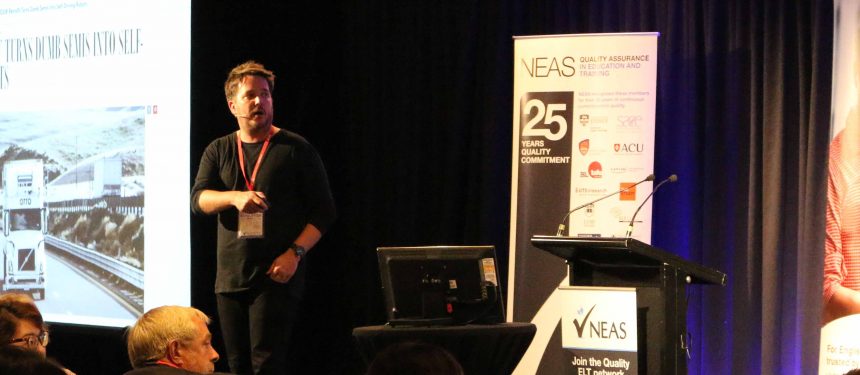Education disruption through technology will increase the importance of teachers rather than replace them, delegates at the recent NEAS conference were told. But while in-person learning will remain relevant, the industry must be prepared for significant changes to its business model.
News and business analysis for Professionals in International Education
Have some pie!
NEAS 2018: Teachers “the future” in education disruption
 Education providers taking an entrepreneurial approach will be the major distributors in ELT, says Chris Riddell. Photo:The PIE
Education providers taking an entrepreneurial approach will be the major distributors in ELT, says Chris Riddell. Photo:The PIE Themed Beyond the Digital Revolution in English Language Teaching and held in Sydney, the conference highlighted how advancements such as virtual reality, artificial intelligence and online courses had increased students’ need for teachers and face-to-face learning.
“Don’t fear a teenager… disrupting the education industry. That’s not who’s going to disrupt you”
“When we talk about [disruption in education], what we normally mean by this is replacing teachers with technology,” said Kate Raynes-Goldie, founder of teaching services provider Future Human Academy.
“Maybe this sounds exciting to technology people; I’m a technology person [and] I’m a little bit concerned by this. I think that teachers are actually more important now than ever.”
According to Raynes-Goldie, technology had become a useful tool for teachers but human qualities, such as empathy and compassion, remained extremely relevant to students.
“Teachers will be the future because you can’t have a computer believe in you. You can’t have a computer make that difference for you, it can help the teacher, help the learner, but it can’t have those transformative experiences… without teachers.”
In the ways technology is currently being used in education disruption, she pointed to the use of virtual and augmented reality, especially within the vocational education and training sector. Virtual reality is being used by some employers to train workers in high-risk professions, she said, such as those that deal with heights and electricity.
“You get this really great outcome where they’re trained safely, they feel confident, they don’t have to be exposed to risk when they’re training,” Raynes-Goldie said.
Additionally, she said that the technology also allowed for instructors to observe their students as they were being trained and provide guidance when necessary.
“We often use VR as a solitary experience and they found that having the instructor be up at the front and being able to jump in and out… hugely useful in being able to teach.”
NEAS chief executive Patrick Pheasant, however, warned delegates there was a need for change within the industry to remain relevant and in business, especially as some products become more adept at translating real-time conversations.
“Teachers will be the future because you can’t have a computer believe in you”
“We know that there are devices in the classroom, we know that there’s translation software, there’s even translation earpieces on the market,” he said.
“My question to you is: what’s left? If we want to keep our jobs as English language teachers and we want to connect with our students and we want to maintain relevance, what is the classroom going to look like?”
According to futurist Chris Riddell, one possible future for the ELT classroom could occur outside of it, with changing business models likely to have a significant influence on education disruption.
Pointing to Amazon’s recent foray into brick-and-mortar stores and its increased market share in retail, Riddel said the business models for many industries were shifting quickly.
“What we’ve now got in our world is a world of category killers where one business owns an entire industry,” he told delegates, adding that ELT was also susceptible.
“Don’t fear hoodies, don’t fear a teenager in a bedroom… setting up a business and disrupting the education industry. That’s not who’s going to disrupt you,” he said.
“It’s an established education organisation that’s been around for decades, that is well funded, and finds out the secret of how to behave like an entrepreneur.”
Technologies influence on education continues to be a hotly discussed topic, with speakers at the recent Groningen Declaration Network conference discussing how blockchain may help education portability.
Still looking? Find by category:


